As a quota refugee you and your family are eligible for a rental apartment in your municipality of residence. The size ...
Usually the rental apartment is rented by the hosting municipality, but in some cases a foundation or a private leaser. ...
The rent of the apartment is paid monthly to the landlord directly through an account transfer. An unpaid rent leads to ...
Usually a quota refugee and his or her family rent an apartment in an apartment-complex which belongs to a housing company ...
The upkeep of cleanliness in the area of the housing company is the responsibility of every tenant. All waste and garbage ...
Each housing company has its own maintenance service, which is contacted for example if the faucets, sinkholes or ...
In the center of each Finnish municipality there is one shop, mostly even two shops. Finnish people buy their food ...
Midsized municipalities and cities have a market where you can buy fresh fruits and vegetables, berries and fish and ...
In recent years the sale of used goods has increased in Finland. Flea markets have a lot of clothes for children and ...
In Finland almost everybody; children, youth, adults and old people use mobile phones. You can either buy a pre paid sim-card ...
It is necessary for every adult immigrant to open his or her own bank account in the municipality of your residence ...
In Finland there is quite a lot of private motoring, but lots of people use the public transport as well. Modes of local ...
People wait for the local buses on the bus stops which are marked by bus stop signs, and where the buses stop to pick ...
In Finland there are state railways. The trains travel widely across Finland. All mid-sized cities have ...
In Finland people cycle a lot. Many people cycle for their school or work trips. Bicycles are parked to the places ...
Smoking in all public spaces; at airports, in train stations, bus stations, buses, trains, airplanes, schools, offices, ...
As a quota refugee you and your family are eligible for a rental apartment in your municipality of residence. The size and the amount of rooms in your apartment depend on the amount of residents, but the basic equipment in the rental apartments are usually the same.
In the rental apartment there are usually a lobby, kitchen, living room, bedrooms, shower room and a toilet.
The basic equipment in the kitchen consists of cupboards, water faucet and a sink to wash the dishes, a cooker and an oven for food preparation. There is also a fridge and in some special cases a dish washer.
The equipment for the bedrooms and the lobby include usually wardrobe for clothes and other belongings. In a Finnish toilet there is a toilet seat and a sink to wash hands in. The equipment in the shower room includes a shower and a drain.
There is usually central heating in the apartments which keeps the apartment warm during the cold weather. Each room has an adjustable heater.
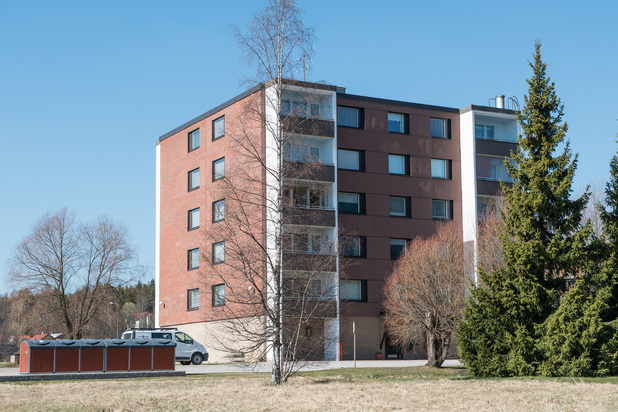
Usually the rental apartment is rented by the hosting municipality, but in some cases a foundation or a private leaser. The landlord and the tenant sign a written rental contract, where the rental amount and the length of the rent are stated. The rental contract binds both parties to abide by the contract. Rental apartments are usually rented unfurnished, without any furniture. So, you can decorate the apartment in the way you and your family want.
The rent of the apartment is paid monthly to the landlord directly through an account transfer. An unpaid rent leads to the redundancy of the rental contract. In addition to the rental payment there is usually a separate water bill, the size of which depends on the amount of residents in the apartment. The water bill covers the appropriate use of water; in case of excess use of water there will be a separate charge.
The tenants have to sign a contract with the electricity provider. The electric bill is paid either every month or four times a year as a direct account transfer to the electricity provider. The size of the electricity bill depends on the usage of electricity in the apartment. It is important to follow the usage of water and electricity, because excess use of these will result in separate charges.
Usually a quota refugee and his or her family rent an apartment in an apartment-complex which belongs to a housing company made up of many apartments. Each tenant of the housing company has to abide by the rules and regulations of their housing company. Silence is required in the housing company between 22pm and 7am.
The laundry room in the housing company can only be used at the reserved times. A car is parked in the parking place only. Also, the tenants have to look after the general cleanliness of the environment and the sorting of garbage. In case of a breach of the rules and regulations, the neighbors will complain to the manager of the housing company.
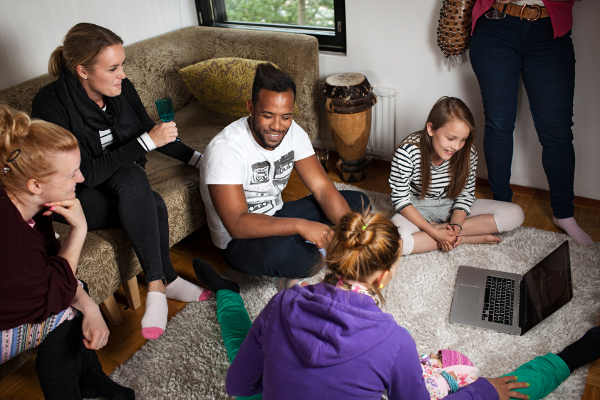
The upkeep of cleanliness in the area of the housing company is the responsibility of every tenant. All waste and garbage bags have to be taken to the garbage disposal meant for these. There are garbage disposals on the yard of every apartment-complex, and tenants take their garbage there.
Most housing companies have separate garbage disposals for different kind of waste. The tenants have to sort the garbage and put them into the right garbage disposals. Usually there are separate disposals for paper, cardboard and bio waste. Some housing companies have waste boxes for glass and metal materials. The rest of garbage is taken to the mixed waste disposal.
Each housing company has its own maintenance service, which is contacted for example if the faucets, sinkholes or heating appliances need to be fixed. If you detect water leakage damage in the apartment, you have to immediately call the maintenance service. Any damage that happens to the rental apartments should be informed to the landlord. The landlord is obliged to fix or change damaged appliances such as the fridge, cooker and faucets. If the damage has been caused by the tenant, she or he may be liable to pay for these.
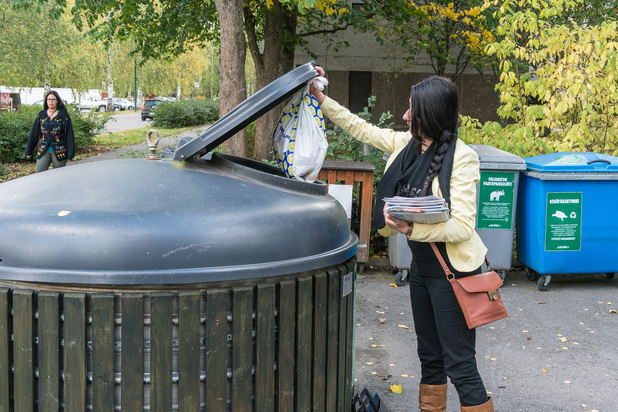
In the center of each Finnish municipality there is one shop, mostly even two shops. Finnish people buy their food and other groceries usually from big shops and department stores. In the department stores there are also shops for clothes and shoes. The prices may vary in different stores. You can get information about price differences from people who have lived longer in the area. When you step into the store you take a shopping trolley or a shopping basket to collect your shopping in these.
The shops have different sectors for different goods. In the vegetable and fruit section you can collect the amount of fruits and vegetables you want into paper or plastic bags. After collection place the bag of fruits or vegetables on the weighing machine, then you press the button of the product number and the machine gives you the price. You place the price tag on the side of the bag. Bread is chosen from the bread aisle. Fish and meat is normally ordered from the counter which is reserved for them. There can also be clothes and shoes for sale in the store and their price tag can be found attached to them. The shopping is paid for at the counter with cash or bank card. In the Finnish stores everyone packs his or her own shopping into the bags.
In midsized and big municipalities and cities you can find food stores owned by immigrants. In them you can find ingredients, spices and other groceries which you need to prepare foods of different cultures. The opportunity to prepare and enjoy food which you are familiar with makes the life comfortable in a new living environment. Ask about shops owned by immigrants in your municipality and around it.
In many shops there is nowadays a post office, where you can send mail and packages and where you can pick up post and packages. In midsized municipalities and cities there is a separate post office.
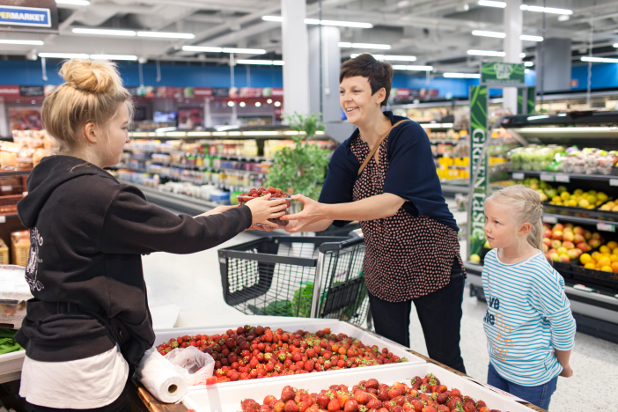
Midsized municipalities and cities have a market where you can buy fresh fruits and vegetables, berries and fish and spend time with people with a cup of coffee. Markets are open from spring to fall, and are closed during the winter because of the cold weather.
In recent years the sale of used goods has increased in Finland. Flea markets have a lot of clothes for children and adults, household appliances, furniture and children's toys which are in good condition and have a good quality. Especially very little used children's clothes are widely available. Get to know your local flea markets before you invest in new products. By buying used products you can save a lot on your household expenses.
In Finland almost everybody; children, youth, adults and old people use mobile phones. You can either buy a pre paid sim-card from your local R-kiosk or you can get the sim card from a phone company and pay the bill monthly.
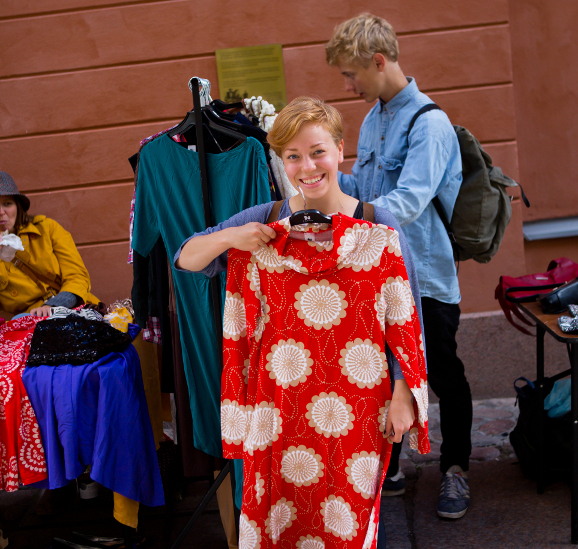
It is necessary for every adult immigrant to open his or her own bank account in the municipality of your residence or in the closest municipality. Bank account is applied for with a written application. Prerequisite for this is a valid passport, residence permit and registration to the municipality.
Once the account is opened you will get a personal bank card. With your own bank card you can withdraw money from the cash machine and pay for your shopping in the stores. Make sure you remember your bank card's PIN number. PIN number is a four digit number that you will get from the bank.There are cash machines in each centers and shopping centers. You can withdraw money from the cash machines, in Euros, which is the currency in Finland and many other European countries. The cash machine is like a small computer. It can only be used with the PIN number. Type your PIN number into the machine and then withdraw money from your own account. It is important to look after your PIN number and your bank card that they won't get lost. In Finland the most common payment method is with the bank card. You put your bank card into a small machine in the store and then type your PIN number. The price of your shopping will be automatically deducted from your account. You can also pay with cash.
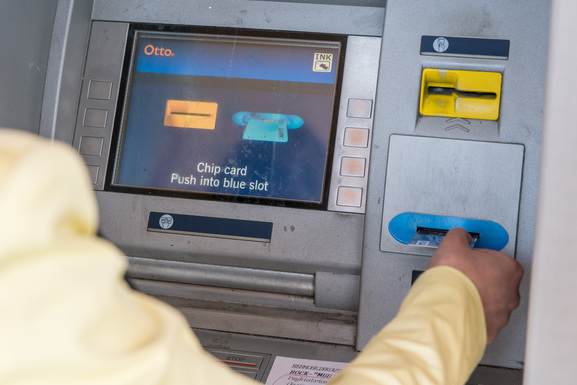
In Finland there is quite a lot of private motoring, but lots of people use the public transport as well. Modes of local public transport include local buses, local trains and trams. There is also a subway in the capital. Modes of public transport for long distance journeys are long distance buses and trains. Travelling on public transport is usually cheaper than private motoring.
People wait for the local buses on the bus stops which are marked by bus stop signs, and where the buses stop to pick up the passengers. When the bus is arriving at the bus stop, you have to signal the bus driver to stop. In most municipalities bus fares are paid with a bus card in which the passenger has loaded money in beforehand. If you don't have a bus card you can pay with cash. Long distance buses pick up passengers from the bus stops meant for long distance buses and from bus the stations. The price for the long distance trips is usually cheaper if you purchase the ticket in advance.
In Finland exists and functions the state railways. The trains travel widely across Finland. All mid-sized cities have train stations. Trains stop at the train stations where the passengers can get on and leave the train. The ticket is usually bought at the train station but they can also be bought in the train or on the internet.
In Finland people cycle a lot. Many people cycle for their school or work trips. Bicycles are parked to the places allocated for them. When cycling, it is important to follow the traffic rules and use a helmet. The person cycling must be mindful of those walking and crossing the streets.
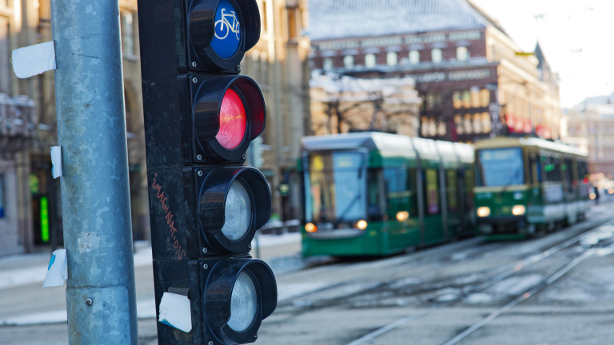
Smoking in all public spaces; at airports, in train stations, bus stations, buses, trains, airplanes, schools, offices, hallways, meetings and else is forbidden by law. There are separate spaces provided for smoking in public places. They are marked visibly. Cigarette stubs are to be disposed into the dustbin meant for them.